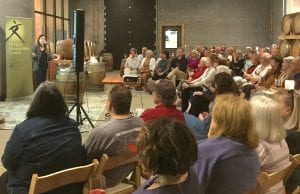Associate director recaps exciting year
Over the past year, the Oregon Humanities Center (OHC) has been brimming with energy as we have put our new strategic plan into action. The strategic plan was developed last summer after OHC stakeholders were asked to share their ideas about the OHC’s mission and future direction.
The scope of the effort was far reaching and has involved launching new programming, welcoming new board members, creating a new website, upgrading the OHC’s conference room technology, installing a reader board to broadcast events and faculty accomplishments, and increasing donor giving that supports the OHC’s research, teaching, and public engagement mission.

Two such new programs included the OHC piloting a new Wine Chat speaker series at Civic Winery with 75 people in attendance, and partnering with the UO’s Research Development Services to organize a National Endowment for the Humanities (NEH) faculty workshop to give 60 faculty the tools needed to apply for external research and course development funding.
The OHC has also been collaborating with Native American Studies to host the Fall 2019 Western Humanities Alliance conference titled “Engaged Humanities: Partnerships between Academia and Tribal Communities,” which will bring together local, regional, and international speakers, scholars, and participants. Additionally, the OHC has been busy planning our annual speaker series and next year’s Wine Chats that will revolve around the theme of “Convergence: the intersection between the sciences and the humanities.”
Another area of work outlined in the strategic plan is to increase the financial support from donors that brings the OHC’s programs to life. Increasing annual giving to the Center ensures the continued strength of the operations, public programming, research, and new undergraduate course development. To this end, the OHC participated in a university-wide “Ducks Give Day.” This single day of giving raised $6,000 for the Center’s Dissertation Fellowship program and was supported by an anonymous donor who provided a matching gift. This campaign focused on one of the OHC’s many programs: Dissertation Fellowships, since the OHC has found that by providing a term off of teaching, graduate students who are pursuing a PhD are able to complete their dissertation more quickly, allowing them to get on the job market faster.
Due to the generosity and support of those who believe in the value of the humanities, the OHC was able to provide funding for 11 faculty research, 4 faculty teaching, 4 graduate dissertation and 3 research support fellows during the past academic year. In this newsletter, you will hear from a few of these fellows about the positive impact that the OHC’s funding has had on their research, publications, teaching, and future careers.
The OHC fellows’ work represents a wide diversity of humanities-related disciplines, including Anthropology, Comparative Literature, History, History of Art and Architecture, Religious Studies, and Romance Languages. These fellowships allow faculty the time to undertake rigorous research—work that can involve archival research, data and textual analysis, ethnographic interviews, and language translation. In their time as fellows, faculty have produced articles for journals and chapters for new books, have completed final chapters of books that are headed to publication, and have designed new curriculum that is supported by original research that will be piloted in the classroom next year.
There is no better time than now to support the humanities. This might mean helping to spread the word about the OHC’s free public events, lectures, and faculty and graduate student talks, suggesting a friend signs up for our print or electronic newsletter, or donating to sustain the OHC’s work. With your support the OHC will continue to thrive.
